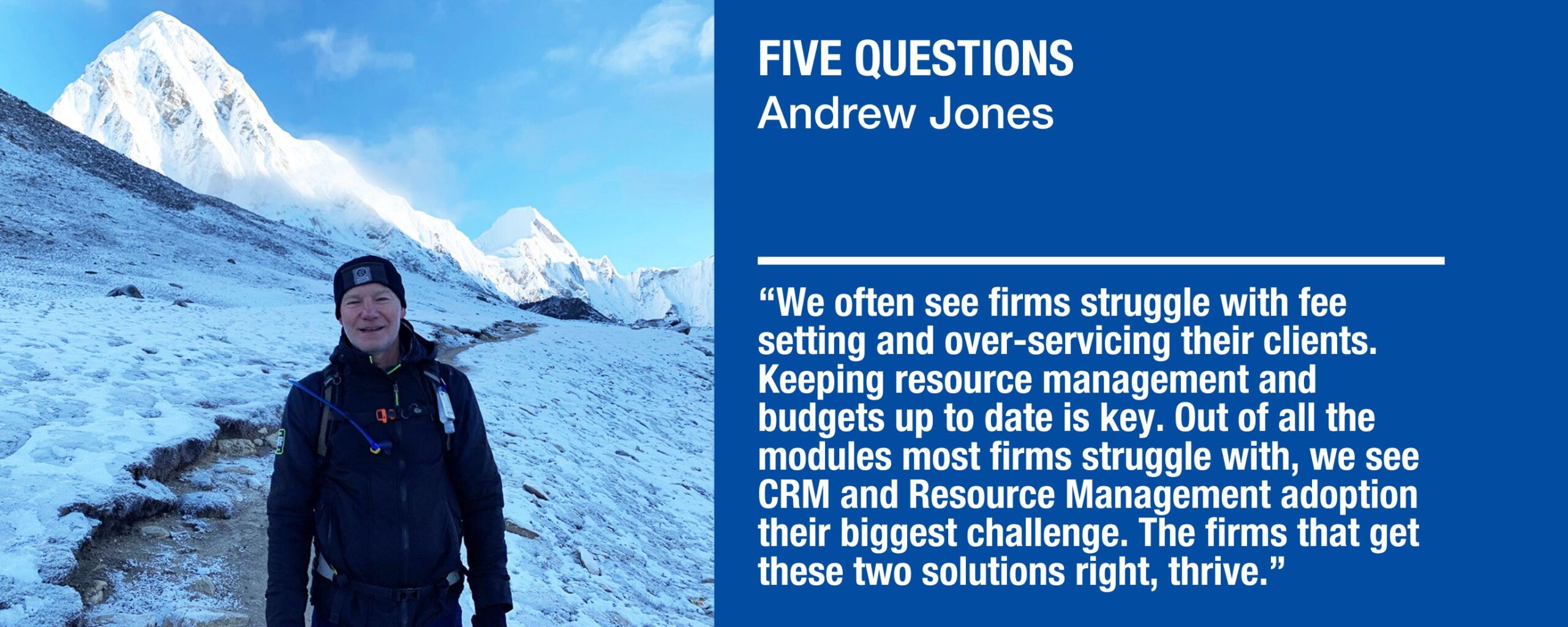Building smart solutions

For more than 30 years, Smartsoftware has been helping architecture practices streamline their business systems and project management. Founder Andrew Jones discusses the company’s evolution, emerging tech trends, and the growing role of AI in transforming professional services.
1. Can you tell us about the origins of Smartsoftware, the kind of work you do, and the clients you typically work with?
Smartsoftware started in Perth over 30 years ago. I am one of the founding directors and our initial focus was ERP Implementation, Support and Managed Services. We were working with a generic ERP solution that suited medium to large organisations, especially if they were project focused. We expanded overseas, working with clients in the USA, Canada, the UK, Hong Kong, Ireland and the Caribbean.
I spent two years in the USA, and that’s when we decided we needed to specialise in the professional services vertical and we started to search for a solution to bring to our region.
We selected Deltek in December 2000, almost 25 years ago, and haven’t looked back since.
Deltek is the leading provider for solutions to the professional services sector. Our clients in the region range from a 10-person architectural firm in Victoria, to a large 3,000-person firm operating in Australia, NZ and Southeast Asia. Globally Deltek’s clients are sector leaders, with firms like Genser, HOK and WPP using Deltek solutions.
Today Smartsoftware is fortunate to work with some of the most innovative and influential architectural, engineering and design firms in the world. Several of these firms have been our clients for over 20 years.
Today, we sell, service, enhance and support Deltek’s solutions in APAC along with our own add-on modules, which are in use worldwide. We have staff throughout Australia, New Zealand, Singapore, Vietnam and the USA.
2. What does your role at Smartsoftware involve, and what does a typical day look like for you?
My role at Smartsoftware as Managing Director/CEO has certainly changed over the years. My background is technical, my Master’s is in IT, so I still love to get involved in the detail when I can.
We have a great team managing our implementation projects, support and development, so even though I love the detail, my role is primarily oversight and keeping the teams on track.
I try to spend most of my day with customers and prospects and about 25% of my time is spent travelling.
Deltek is our key partner, so once or twice a month I sit down with Deltek and our other suppliers to look at improvements we can make to better service our clients.
As a reseller and a firm that develops our own solutions, I am constantly reviewing solutions that might fit our client’s needs. This may be a new product we integrate or something we build as an add-on solution or extension. I am always on the lookout for technology solutions that will benefit our clients and add value.
3. How long have you been in the software industry, and what major shifts have you seen during that time? What key trends or challenges do you see emerging in the years ahead?
I’ve been in the industry for over 40 years, so I have seen a huge change technically. I started working with mainframes and in the banking sector. The IT department (or EDP as it was called then) was a mystery for most of our end users, and essentially they used the systems and processes we selected and designed for them. There was very little input from the end users compared to now. It was all about processing the data efficiently and not necessarily the end user experience.
My working career also started pre-internet (or World Wide Web), without email and no mobile phone. Imagine that! The availability of information and the global nature of the way we do business now has completely changed. I could not do my job as effectively without these technologies.
Today our clients are better informed about their technology choices. Most firms are speaking with their peers in the industry and recommendations are very important. This is very different to when I first started. The IT solution was a closely guarded secret!
Implementing solutions today is also a much more collaborative endeavour and the timeframes are also much shorter as a result of industry-specific solutions. Many of our consultants have worked for design firms and understand the current challenges.
Australia is a busy, competitive market, and this gives firms a lot of choice when they are looking for a solution to run their practice. We still come across firms using spreadsheets or homegrown solutions, and as a result they are often locked into an old technology platform. This leaves them in a tricky position, with some difficult decisions when moving to a new platform or investing in the current one.
The move to subscription (SaaS) and cloud is not new; however, the need to keep up to date with the latest technology is becoming increasing important, with security threats and data breaches more common. SaaS platforms are the default choice for most of our new clients.
In addition to security and technology issues, the need to attract the right talent is critical, and practices need to have systems in place that will support staff development, as well as assisting them in their day-to-day decision making. Project managers want to have tools that help them to be better project managers. AI will increasingly play a role here.
Best of breed was the mantra when I first started working in the software industry, which means firms try to pick the best solution for each business area and then go about integrating them.
ERP, PSA or Practice Management Systems like Deltek are a fully integrated suite of applications that will manage the complete project life cycle, from the initial opportunity and proposal to the project close out. These solutions continue to be the default choice.
Software implementation projects have also changed, with pre-configured solutions now enabling deployment in weeks rather than months.
A general trend we are seeing is our clients requesting additional managed services as they concentrate on core activities and outsource some of the running of their solutions to a specialist.
4. AI is transforming how many industries operate – how is it influencing the kinds of business solutions you develop at Smartsoftware?
I recall working in an expert system some 35 years ago that analysed disk space used, and predicted growth (mainframe disk space was very expensive). We used a language called PROLOG, which is still used in AI today. We only had access to our data and we still got valuable information from the solution. Today, the learning data sets are much larger, so results have improved considerably.
AI is and will continue to play a huge role in the solutions we sell, build and implement.
Our AI strategy is discussed in every prospect meeting and as we create add-on solutions we are reviewing how AI can assist. This is not just in the development of these solutions to bring them to market sooner, but where AI will add value to the end solution and the client interaction.
Deltek’s AI strategy revolves around their digital assistant Dela. It’s possible to ask (prompt) Dela to give you insight into your firm’s projects and clients.
There are also smart preconfigured prompts available. As anyone who has worked with AI knows, correct prompting is key to getting the right results.
In addition to just asking AI to give you results, agents are on the rise and a sample of the usage cases being worked on right now include:
- An agent to assist with month end/year end/project close out.
- An agent to review project performance and make suggestions.
- Proposal/tender writing.
- Autonomous agents that review and cleanse client and contact data.
For me, the smart agent technology is the next exciting chapter on how we will utilise AI to assist us.
5. From your perspective, what are the biggest challenges and opportunities facing the architecture profession, both now and into the future?
AI will not take your job as an architect, but the person with better AI skills than you will. We all need to skill up on AI and realise it’s a tool to assist us and not something that will replace us.
Design firms need to skill up their staff with financial literacy training and manage projects to key KPIs. Every architect doesn’t need to be a financial analyst, but they need some basic skills on how to interpret a P&L and Balance sheet as well as understanding the financial levers they can pull when managing a project.
We often see firms struggle with fee setting and over-servicing their clients. Keeping resource management and budgets up to date is key.
Out of all the modules most firms struggle with, we see CRM and Resource Management adoption their biggest challenge. The firms that get these two solutions right, thrive.
Andrew Jones is the Founder and Managing Director of Smartsoftware, a valued ACA partner.
